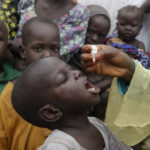It was an innovation that even the Plateau state governor, Jonah Jang, who was the guest of honour at the occasion could not help but comment on: “you are among the first ethnic groups to have initiated a viable cultural reunion such as the one we are witnessing today. For this I say, congratulations!”
For those who are familiar with the cultural terrain in Plateau, the governor’s comment underscores one of the most challenging aspects showcasing rich heritage of the people; with surfeit of ethnic trying to outdo one another.
With over 50 recognised ethnic groups on the Plateau, the enormity of this challenge is better appreciated.
The Vwang example, which ties major events of six components of Mupun culture together to make for a grand display, seems the ready answer to avoiding a clash in the annual exhibitions of the culture of the diverse ethnic groups on the Plateau and adds value to what an otherwise piecemeal and individual hosting of such events would have meant.
The success of the event is captured in the number and calibre of people that attended the occasion, despite the remote venue, and the frightening steep location made worse by the snaky and heavily dusty road.
People came in their thousands from far and near, with the presence of important dignitaries that Jos could be said to have emptied itself in Lankang.
They include the state governor, Jonah Jang, former governor, Joshua Dariye, former minister, Damishi Sango, speaker of the Plateau House of Assembly, Istifanus Mwansat, his deputy, Ibrahim Baba Hassan, gubernatorial hopefuls, Chris Giwa and John Alkali and many others.
But the Vwang 2010 festival evinces more qualities of being grand due to the added vista of honouring people considered to have done something for the Mupun people, regardless of whether or not they are sons of the soil.
Ten people were listed as worthy of receiving traditional titles from the Mupun nation. The ceremony was performed by the traditional ruler of the Mupuns; Mishkom Mupun; Da Nuhu Dashwep, who signifies the apogee of spiritual attainment in Mupunland as well as the custodian of the culture of the people.
The Mupuns believe that to be bestowed by such a man goes beyond mere decoration with a rank, as the performance of the rites of conferment by no less a personality resonates with the pristine spiritual beliefs of the people.
This is why, according to Mupun traditionalists, the ceremony had to be performed in the palace and not in the open because only men who have distinguished themselves would have the privilege of witnessing such.
In the recent ceremony, the conferment was done around 9am, under the most solemn atmosphere as each of the chosen was called and dressed by the traditional ruler while chanting the title and the significance of the title to the person and to the community.
The titles given away that day include the Kworong Mupun, which was conferred on the speaker of the Plateau state House of Assembly, Hon. Istifanus Mwansat, the Ngu Bam Yil Mupun, conferred on former governor of Plateau state, Chief Joshua Dariye, the Ngu Wang A’ar Mupun on Professor Dakum Shown and the Ngul Wal Mupun reserved for Owelle Rochas Okocha. Chief Maichibi Vwarji, was conferred with Mishkom Lek Mupun, Dr. Patrick Dakum Ngu man-dak Mupun, Robert Taple, as Ngu Dyel-pe Mupun, Ardiyel Dafur as Ngu dak yil Mupun and chief Simon Tangni as Ngu yel yil Mupun.
Except for Okorocha who could not make it to the ceremony the rest who appeared in person were decked after the conferment with a blue striped white garment and a fez to crown it all.
After the palace ceremony which was viewed mainly by men, the other aspect of the ceremony moved to the village square for all to see.
Women, children, the aged, as well as visitors thronged the venue of the ceremony as early as 8am waiting to behold the much talked about event.
Women came dressed in different colours, but with most making a cultural statement about the culture of the Mupun people. The rainbow of colours was rich as it was exciting.
The men also were not left out as they streamed out of their homes looking colourful as they drenched themselves in attractive colours sown in different styles but mainly in the form of kaftans and babarigas.
There were more than a handful of dancers from all the Mupun villages of Tambes, Nen Dai, Jelbang, Jeopkul, Difir and Muktop.
The common ground in their exhibition remains the dance steps which are performed by the wriggling of bodies in rhythm to the accompanying beats by the drummers.
The Mupuns according to historians are said to have migrated form the present area covering Borno state but settled in neighbouring communities like in Ngas and Mwaghavul lands before taking hold of the present place they call their own. Lankan became the administrative headquarter in the colonial days.
A patrileneal ethnic stock, a Mupuns child identifies with the father and strives subsequently to gain identity and recognition from the paternal side.
National president of the Mupun cultural development association, MUCDA, Chief Casmir Kumtap gave the opening remark and welcomed guests to the ceremony while highlighting the significance of the event to the people.
He acknowledged the presence of the dignitaries that had turned up for the occasion and assured them of the hospitality of his people praying God to grant those that came from far and near to felicitate with his people safe trip back to their destinations.
The title holders were then beckoned to step forward and be presented with certificates for the honour done to them.
The presentation of the certificates was done again by the Mishkom Mupun again, this time wearing a dark cultured robe over his flowing babariga that accentuates the magnitude of his personality. He was sandwhiched in between two of his chiefs, the Mishkon Abwor Dyis and the Mishkom Jing Da Panshik Shepe ii as he performed this part of the ceremony.
After the presentation of certificates, the various dance groups were allowed to perform in what was called a cultural match pass. The Kok Fer, Kok Ndup, mushere and Ngas dancers all performed.
The performance consisted of women, youth and other mixtures. The display itself is a pot pouri of steps, wriggles, demeanour, panache, music and other tunes.
At different stages in the course of performance, the audience defied the security men demarcating the arena from the stands and joined the dancers in any of the dances they identify with when it becomes unbearable to sit in a place and watch.
Former Governor Dariye stole the show when he was presented with the certificate and the Mushere people came to rejoice with him. He stepped forward and dissolved in their midst twisting and shaking with dancers in an electrifying frenzy that almost created a hysteria among the cheery audience.
Governor Jonah Jang was then called to give his speech. That was when he commended the Mupuns for harmonising their cultural day as well the effort put to organise the occasion.
“This appreciation has informed the decision of the state government to commence work on a cultural calendar for all the major festivals in the state. The idea is to coordinate our cultural festivals in such a manner that the dates for celebration do not clash, so as to engender participation by other ethnic groups,” he stated.
He called on the Mupun to unite with other people from the state to achieve unity so as to fight the forces of destabilisation whom he said were out to cause disunity among the people and explained that he had to send the contractor handling the construction of the road project to Lakang away because he was not satisfied with the quality of work done and promised to award the contract soon so that work will continue on the road.
Dariye who spoke with newsmen after event thanked the Mupun people for the honour done to him saying his close affinity with the people from that stock makes him feel at home any time he is in Mupun land.
“The Mupun, the Mushere, the Mwaghavwul, Ngas etc are all brothers. So even if I will reject other chieftaincy titles but not this one. If a prophet can be respected home, then this prophet must be a good one,” he stated.
The speaker of the state House of Assembly, Istifnaus Mwansat on his part said he cherishes the title because his people are telling that he is doing well. The challenge is for one to continue with what will bring development to the people,” he stated.
Dr Patrick Dakum who is a Mupun man also expressed happiness with his people for giving him the honour. He said since he is in the business of fighting HIV/AIDs, he will strive to do more in that regard so as to eliminate the chances of the diseases getting hold of people and to create maximum awareness for such adding that the title is dear to him and will do all to maintain its dignity.
Taple, who served as permanent secretary in the Plateau government house under Dariye was also filled with joy and expressed happiness for the honour done him by his people.
Vwarji who was given the title equivalent of the generalissimo of the Mupun people promised to keep up the good work he had been doing and pledged to defend the dignity of the Mupuns wherever he finds himself.
The ceremony was formally brought to a close with the departure of the governor from the venue around 4:pm but the atmosphere in Lankang which had by then had become drenched in conviviality endured as children, youths, men women and the aged continued with the dance as the walked home, sustaining the mood long after the dusts that signified the departure of the guests had long evaporated.
 Join Daily Trust WhatsApp Community For Quick Access To News and Happenings Around You.
Join Daily Trust WhatsApp Community For Quick Access To News and Happenings Around You.


